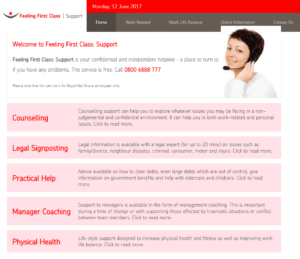Recently named as one of the most influential people in Health and safety, Dr. Shaun Davis is a well respected figure in the profession. SHP sat down with Davis to talk health and safety and “Feeling First Class.”
Dr. Shaun Davis, visionary leader of safety, health, wellbeing, sustainability environment and quality (HSSEQ) has one piece of advice for young people embarking on a career in the health and safety profession.
“Don’t allow yourself to become pigeonholed.”

With four masters and a doctorate, Davis has made sure that he can fight any fire that may break out in the day to day running of the Royal Mail, one of the oldest delivery services in the world. I ask him if he thinks personal education is important for health and safety professionals.
“I think it’s huge. Ongoing professional education is really important. I think that those in the safety profession who don’t pursue it are doing themselves a disservice, they pigeonhole themselves.”
“If I use myself as an example, I have four masters degrees and a doctorate. Those masters are in leadership, innovation and marketing, business and workplace health and wellbeing. I deliberately went for that range.”
“I believe that to properly contribute to your business you need to have an insight into how that business works. I don’t think of myself as a health and safety professional, I think of myself as a business professional with a safety, health, wellbeing and environmental bias – a passion.”
Modern safety in a historic business
What skills should a business professional with a bias towards health and safety have?
“It’s a given that you should know your subject [health and safety]. You’ve got to know about health, safety and environmental issues and have the credentials to back that knowledge up.”
“You also understand the environment you’re working in, you should be able to persuade and lead workers, promote your own agenda and have the tool and knowledge to deal with any challenge you may face.”
“One big mistake a lot of health and safety professionals make is by relying solely on health and safety. I believe you really need to understand the economic and workplace place challenges your business faces. You need to be able to meaningfully contribute to the company.”
The Royal Mail can trace its history back to 1516 when Henry VIII established a ‘Master of the Posts’. What does the safety culture for such a historic company look like?
“Being 500 years old gives us a very established and proud history. This plays into the safety culture quite nicely. Everyone respects each and everyone wants to do the best job they possibly can.”
“Obviously we’re not perfect. We have our own challenges and issues that we have to face. The thing is though, we all have a sense of being part of something bigger. We like to push the idea of collective ownership and collective responsibility.”
“We also have great working relationships with our union colleagues. We’re heavily unionised with the Communication Workers Union and Unite. I wouldn’t have been able to achieve a number of things I’ve been able to achieve without their support. Overall our safety culture is very collaborative and supportive.”
Mitigating unique risks
Davis describes the risks the Royal Mail faces in its day-to-day operations.
“Well we have our “under the roof” activities, which is everything that has to do with moving machinery and vehicles. We have over 50,000 vehicles on the road so that’s a big area of risk to think about.”
“We also have the physical work of our post men and women moving and delivering parcels and letters. With that comes the public interface which brings its own unique risks.”
The Royal Mail’s postmen and women deliver six days a week to more than 29 million addresses across the UK and dog attacks are a significant hazard with an average of seven postmen and women attacked each day across the UK
“We have over three and half thousand dog attacks a year. Occasionally one of our vehicles might be attacked and have items stolen from them. We a logistics company, a manufacturing and a delivery company so our risks are hugely diverse.”
So how does the Royal Mail mitigate those risks?
“We make sure our employees and managers are trained and ready to deal with challenges. That’s the basic approach.”
“In terms of animal attacks, we work with members of the public and organisations like Battersea Cats and Dogs Home, the National Police Chiefs Council and the National Dog Warden Association to educate dog owners about their responsibilities and way they can help our people.”
“So while we make sure we keep training and educating our staff, there’s also an element of training and educating the general public.”
Davis tells me that Royal Mail tries to solve the problem through public outreach.
“We have a dog awareness campaign each year in the summer that’s quite successful. We also send out postcards with information to our customers. We try to work with the owners of particularly dangerous dogs.”
“We also go into schools and communities to educate young people on the dangers of dog. Obviously we have our traditional risk assessment methods that we still use.”
Feeling First Class
The importance the Royal Mail places on the safety of their employees can be seen in their “feeling first class programme, as Davis explains.
 “Feeling first class is the umbrella term for our health and wellbeing program. We have “first class” mental health, we have “first class” fitness and we have “first class” support, which is our employee assistance programme.”
“Feeling first class is the umbrella term for our health and wellbeing program. We have “first class” mental health, we have “first class” fitness and we have “first class” support, which is our employee assistance programme.”
“Having a brand to put our health and wellbeing operation has meant people have been really getting behind it. People sign up to the programmes and in the space of a year we’ve gone from 8000 member to 24,000 members.”
“We have “feeling first class app that people can set and track their fitness and safety goals. It’s been a very successful programme.”
You can access the Royal Mail’s Feeling First Class website here and app here.
The Safety Conversation Podcast: Listen now!
The Safety Conversation with SHP (previously the Safety and Health Podcast) aims to bring you the latest news, insights and legislation updates in the form of interviews, discussions and panel debates from leading figures within the profession.
Find us on Apple Podcasts, Spotify and Google Podcasts, subscribe and join the conversation today!


 “Feeling first class is the umbrella term for our health and wellbeing program. We have “first class” mental health, we have “first class” fitness and we have “first class” support, which is our employee assistance programme.”
“Feeling first class is the umbrella term for our health and wellbeing program. We have “first class” mental health, we have “first class” fitness and we have “first class” support, which is our employee assistance programme.”
Great article, good feeling which is becoming ever important lately. I am very interested in what your techniques are as I seem to be a lone campaigner to solve H&S using technology
Good to see an holistic approach to health and safety, well being – an understanding of operational and managerial constraints and drivers is vital.
Im interested to know whether you will be running graduate / apprenticeships in this discipline?
Interesting article but from personal experience this H&S system is not being fully implemented at frontline level in RM. Walk logs are not regularly updated and the only H&S that local level management seem to be interested is dog attacks. Paid release time to fulfil the role of HS Rep was a complete joke, no involvement in incident reports or investigations, and getting the staff on board was a non-starter. The only time staff approached the HS Rep was when something was wrong, and most of the time it was something they could have dealt with. I believed that the… Read more »
Great to see an inspirational, intelligent and thought provoking interview challenging how health and safety can take itself forward
Having been inspired by Shaun in the first place- he gave me my opportunity in H&S and remains an inspirational person to me, I agree with the concepts he states; a wider understanding of people and business is the key; however, it must be understood that 4 MScs and a Doctorate come at a cost- Shaun is presumably lucky enough to have has these or time subsidised? I have paid for several courses- these add up. especially when not on a Directors salary, as does time to complete these on top of a day job, so I supsect the real… Read more »
Postman on the wirral